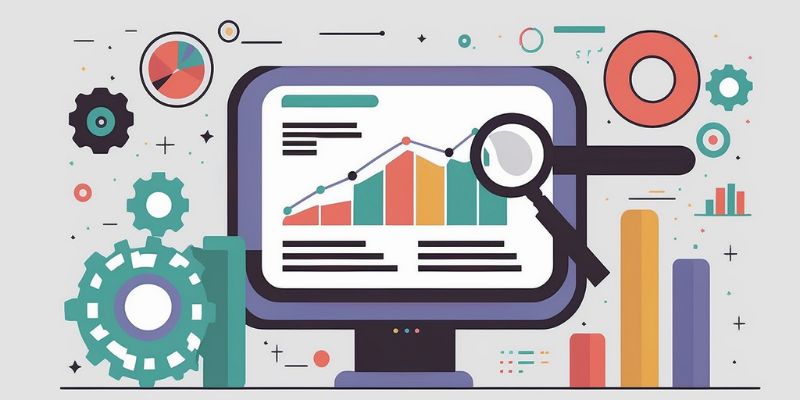Be aware of potential drawbacks of AI SEO tools—it’s a warning worth heeding. As you dive into the digital marketing deep end, AI can seem like a lifesaver. But before you trust its robotic arms to keep your SEO afloat, let’s navigate the murky waters together. I’ve seen plenty of clever tech, yet I know that algorithms aren’t always the hero we expect. They churn out data, but miss the human touch. Imagine relying on a tool that can’t grasp sarcasm or culture—it’s like baking a pie with all the gadgets but no taste. Stick with me, and I’ll guide you through the shortcuts and the blind alleys of automated SEO. We’ll learn to spot the telling signs when AI takes a wrong turn and how to keep your strategy on track. With this expert map, you’ll dodge the pitfalls and stride confidently towards success.
Understanding the Limitations of Automated SEO Software
Recognizing the Boundaries of Machine Intelligence in SEO
Artificial intelligence can do a lot for SEO, but it’s not perfect. AI tools may suggest keywords that don’t make much sense for your site. They miss the mark sometimes. A tool might say “shoes for feet” is trending, but that’s too broad. We need to think smarter. Real people wouldn’t search like that. We know better than machines which terms will truly connect with our audience.
AI also has trouble with nuances. It might not get local lingo or new slang fast enough. And it can’t always tell what’s cool or trending in human culture. This is where we step in. Our human understanding fills the gaps AI leaves behind.
Overcoming Inaccuracies in AI Predictive Capabilities
Sometimes, AI in SEO makes wrong calls about future trends. The tools predict based on data, but data changes fast. A hot topic today might be old news tomorrow. These tools might not catch on quick enough. That’s a big risk in using AI for SEO.
To deal with this, we need to check AI’s work, like a teacher with red pen in hand. We ensure it’s kept up with the times and hasn’t missed anything key. It’s about balance – letting AI help us without letting it take over.
AI-generated content can sometimes miss the mark as well. Readers can tell when something doesn’t sound quite right. So we gotta be sharp about the content AI gives us. We’re like quality control, making sure every word counts and rings true for the reader. English evolves every day, and AI can’t always keep up.
Bias in AI SEO solutions happens, sadly. AI learns from old data that might have unfair biases. We check for this, pushing for fairness in how AI shapes our SEO.
And let’s not forget, depending too much on AI SEO tools has its pitfalls. If that’s all we use, we forget how to SEO the good old-fashioned way. Our skills might get rusty without practicing the basics. We need to keep our hands in the game.
We also watch for SEO data privacy issues with AI. People care who sees their info. We protect their data just like we’d protect our own.
Errors in tools? They happen. Managing AI SEO tool errors mean we fix them fast and learn from them. We stay ready, so the same mistakes don’t happen again.
AI content generation is hot, but it’s got limits too. We need to make sure any AI-written content feels real. It should sound like it came from a human who cares, not a robot who’s just doing a job.
And finally, we keep an eye out for search engine penalties for using too much AI. Engines like Google want to see real people behind content. If it looks too automated, we might get a slap on the wrist. Let’s not let that happen.
In a nutshell, machines help us with heavy lifting, but the real finesse? That’s all us. We bring heart to the digital world, outsmarting the machine.

The Ethical Challenges and Data Privacy Concerns in AI SEO
Addressing Bias and Fairness in AI Solutions
When we use AI for SEO, we must tackle bias head-on. AI learns from data it gets. This data can mirror real-world unfairness. Take, for example, a job site ranking system. If past data show bias in hiring, AI may repeat this unfair pattern. To avoid this, we carefully choose diverse and fair data. We aim for solutions that treat everyone equally.
Ensuring Data Privacy in AI Content Optimization
Data privacy in AI SEO is super important. When AI optimizes content, it may use personal info. This can risk leaking private details. Our goal is to keep user data safe. We make sure AI follows strict rules on what it can and can’t do with data. We also check that AI does not store personal info that it does not need. This way, we keep your data private and secure.
Mitigating Risks Associated with AI-driven SEO Strategies
Dealing with SEO Automation Problems and Tool Errors
AI is smart, but it can make mistakes. Those errors can hurt your website’s rank. Let’s talk about fixing them. First, check the tool’s settings. Just like finding a lost phone by checking the couch first, it’s good to start simple. Sometimes, a wrong click sets things off-track.
Troubleshooting AI SEO tools means being a detective. Look for patterns. See if errors pop up after updates or specific tasks. When you find a pattern, you’re one step closer to a fix. Maybe your tool got mixed up by the latest search engine change. If so, waiting for an update from the AI tool can be the best move. But don’t lean on this wait-and-see tactic too often.
Be the boss of your tool. If it keeps messing up, maybe you need to switch it out. It’s like in soccer – if one player isn’t doing well, the coach may need to sub them out. Sometimes a new tool solves the problem. But before you switch, give feedback to the creators. They might fix it, and it could work better than before.

Managing the Risks of Over-dependence on AI in SEO
Relying too much on AI is a trap. Sure, AI helps a lot, but don’t forget who’s boss – you. AI can’t understand people like you can. You know what folks enjoy reading. AI, not so much.
When you depend on AI for everything, you might miss the mark. What if the AI chooses keywords that sound odd? Your readers will spot the fakeness fast. It’s like using a translator at a family dinner. Some things just won’t sound right. Keeping tabs on what AI does is key.
Let’s not hand over our jobs to AI. It’s great for help, but not for taking over. Think about carpenters. They use tools to craft wood into fine tables, but the soul of the work? It’s all them. With AI, it’s similar. Use it as a tool but trust your human touch.
AI can’t feel. It may know what people search for but not why they search for it. Keep asking why. Use your brain to figure out what people need. Then, use AI to help deliver that. Like making lemonade – AI can squeeze lemons, but you choose the sweet balance.
Always watch out for biases in AI. It learns from data that may contain stereotypes. Just like we teach kids right from wrong, teach your AI good practices. Clean it up by feeding it diverse and good-quality info. And do regular checks to keep it in line.
Remember, AI won’t tell you if it’s getting lazy with keyword research. You’ve got to spot that yourself. If you see your SEO results dropping, dig into it. AI may be slacking, and it could be time for a change. Watch out for signs that the AI is recycling old ideas. Fresh thinking beats same old, same old.
In short, use AI but use it wisely. Train it, guide it, but don’t let it loose without a leash. And like any good leader, take charge and know when to step in.
Balancing AI and Human Input for Sustainable SEO
Evaluating the Impact of AI on Content Quality and User Experience
AI is changing how we do SEO. But, it’s not perfect. Sometimes, it misses the mark on what people really want. Machines are smart, but they don’t understand us like humans do. So, if we rely too much on AI, our web content might not hit home with our readers.
When AI writes content, it can miss out on our human touch. Think of it like a robot telling a joke. It might know the words but not the feeling. And feeling matters. When we talk to our friends, we tell stories, speak with emotion, and share experiences. AI is still catching up on this.
Using AI can make SEO faster. But speed is not all that’s important. We need to make sure our content feels right. It should be clear, helpful, and something people can trust. If a website feels odd or off, folks won’t stay long, and that’s bad news for SEO.
We should use AI to help us, not replace us. So, when we use AI tools, we should always check their work. Like a math teacher checks a student’s homework. And we must keep our writing friendly and true. This makes sure we give our readers what they’re looking for.

Maintaining Transparency and Aligning AI with Search Intent
Now, let’s chat about being open and honest. People like to know where things come from. If AI helps make something, let’s tell them. This builds trust. And in the world of SEO, trust is everything. Without it, our websites can’t grow.
When we use AI, we need to think about what people are really searching for. AI can guess, but only we can truly get it. For example, if someone asks “How do I bake a cake?” they are not just looking for recipes. They might also want tips, pictures, and maybe even a video. AI might just give them steps. But we can give them the full story.
Still, remember that AI is not always right. It can goof up and guess wrong. Then we need to step in and fix things. Otherwise, we might lead our readers down the wrong path. And that’s not good for anyone.
We should always ask ourselves if what we’re doing makes sense. Not just for the search engines but for the humans on the other end. In the end, SEO is about people. And people want content that matters to them. AI can help, but only if we keep it in check and use it wisely.
In this post, we dived into the good and the tough parts of using AI for SEO. We explored how smart machines help us and where they fall short. We learned that these tools can mess up and don’t always get human touch right.
We also tackled the big questions about doing what’s right and keeping data safe when using AI. It’s crucial to keep bias out and protect privacy while tweaking site content.
Next, we looked at risks. Putting too much faith in AI can lead back to square one if we’re not careful. We must stay sharp and ready to fix any blunders that come up.
Finally, we talked about balance. For SEO that lasts, we blend AI smarts with a human’s eye. We make sure tech serves real people’s searches and keeps things clear and honest.
My last bit of wisdom? Use AI, but never forget the human heart of the web. It’s about connecting folks with what they need. Stick with that, and you’ll win at SEO.
Q&A :
What are the limitations of using AI for SEO purposes?
AI SEO tools have transformed the digital marketing industry by automating complex and mundane tasks. However, some of their limitations include a lack of understanding of human nuance and creativity, potential for generating content that might not adhere strictly to Search Engine guidelines, and the inability to fully grasp and adapt to the ever-changing nuances of user intent.
Can AI SEO tools harm your website’s search engine rankings?
While AI SEO tools can greatly enhance your SEO strategies, misuse or overreliance on these tools can potentially harm your website’s rankings. Over-optimization, generating low-quality or duplicate content, and failing to align with search engine guidelines can lead to penalties or a drop in search visibility.
How reliable are AI SEO tools in understanding search intent?
AI SEO tools are programmed to identify patterns and keywords that are indicative of search intent, but they can sometimes miss the mark. They may not always capture the subtleties and context of user queries, which can lead to recommendations that don’t fully align with what users are seeking. Human oversight is often necessary to ensure accuracy and relevance.
Are there ethical considerations when using AI SEO tools?
Yes, there are ethical considerations regarding transparency, authorship, and content originality. Using AI to create content might lead to questions about authenticity and trustworthiness. Additionally, the potential for AI to manipulate search rankings unintentionally may raise ethical questions regarding fair competition online.
What is the future of AI in the realm of SEO?
The future of AI in SEO seems promising, with continual advancements in machine learning and natural language processing expected to improve the efficiency and effectiveness of SEO strategies. However, its evolving nature means there will always be a need for human expertise to guide its application and ensure adherence to ethical standards and search engine guidelines.



